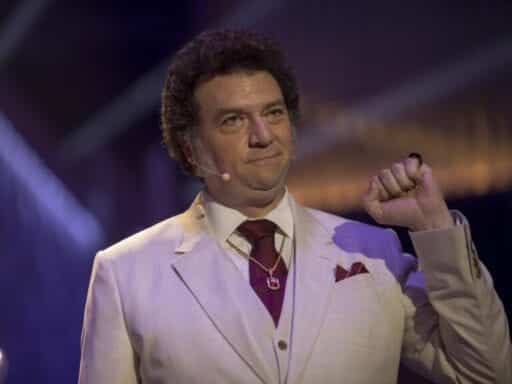Danny McBride’s new show satirizes — and sympathizes with — a family of televangelists.
The Righteous Gemstones, HBO’s latest dark comedy from the mind of Danny McBride (Eastbound & Down, Vice Principals), has just joined the network’s Sunday night lineup, making an unlikely but fitting companion to its dark soap Succession. Both series are about families of high-strung fools who try to compensate for the emptiness at their core with the status symbols of extreme wealth.
But the trappings of that extreme wealth are very different on these two series. Where Succession’s central family is one of coastal decadence, The Righteous Gemstones centers on a family of televangelists whose megachurch empire has earned them considerable sums of money, but who seem to have forgotten the whole “It’s easier for a camel to pass through the eye of a needle than for a rich man to enter the kingdom of heaven” thing.
The Righteous Gemstones is a Danny McBride show, so the righteous Gemstones of the title are about to be drawn into some very bad behavior as the show begins. And the show is terrific at examining the intersection between American Christianity and American capitalism. (There’s a sequence in a later episode that details the cost of all the cool stuff this family owns.) But it’s drawn some criticism in its lack of desire to tackle post-Trump evangelicalism, which sometimes seems hell-bent on supporting the president no matter what he says or does, and regardless of how his statements and actions might contradict what is written in the Bible.
Vox culture’s critic at large Emily VanDerWerff and film critic Alissa Wilkinson both grew up in the sorts of evangelical Christian subcultures depicted on this series, and both continue to attend church (though much more boring mainline Protestant churches, whose pastors are unlikely to be wrapped up in a massive blackmail scheme). They got together to talk Gemstones, evangelicalism, and Danny McBride more generally.
Emily: I’m fascinated by how frequently the very things I love about Danny McBride’s work — his seeming unwillingness to mock or condemn his characters for reprehensible behavior — are the things that turn off other viewers and critics.
On the one hand, I get it. TV has a tendency to normalize characters and situations, because we spend so much time with them. On the other hand, I’m not sure how much more The Righteous Gemstones can do to make clear that its characters have been warped and destroyed by their wealth, and that their relationship to their faith has become vague and tangential at best.
The show hits home for me, but I can still see why some people think it misses the mark of being strong satire about evangelicals in Trumpland. Where do you come down on it, Alissa?
Alissa: I’ve only watched the pilot so far. It’s delightfully twisted. I want to watch more. But I have a couple of things to say about that particular criticism, in general.
One big problem is that “evangelicals” aren’t, strictly speaking, one thing. Evangelicalism is a swath of Christianity that encompasses a huge number of denominations, theologies, ethnicities, geographies, ideas about how churches should operate, even political persuasions. There was, at one time, a set of theological beliefs that undergirded every church that claimed to be “evangelical” (basically about the inerrancy of the Bible and a personal relationship with Jesus), but studies seem to show that those beliefs now vary among subsets of evangelicals too.
/cdn.vox-cdn.com/uploads/chorus_asset/file/18995384/a461f7acebca6c63875517a9560abb99a889fb09cb9641505a634a15e262443711a41ac7127d36172d24d4acc2daf1e0.jpg) HBO
HBOMy point is that the family at the center of The Righteous Gemstones fits into a very particular subset: megachurch evangelicals, many — but by no means all — of whom are white. And while that’s also the subset into which a lot of famous evangelicals fall, like prosperity preacher Joel Osteen or the Trump acolyte Robert Jeffress, it is hardly representative of all Trump-country evangelicals. Some are tiny rural churches that are barely hanging on, while others are just not wealthy enough to have the flash and splash of the Gemstones’ church.
(The closest comparison to the latter category I’ve seen onscreen this year is in the Christian film Breakthrough, which stars Topher Grace as a peppy new pastor near St. Louis who’s driving Chrissy Metz’s women’s ministry coordinator to distraction with his attempts to appeal to the youths. Cedric the Entertainer’s church in First Reformed is a close second, though it’s set in mostly red upstate New York, in the same county where I grew up.)
So The Righteous Gemstones is really only a satire of a particular strain of evangelicalism, one that’s replicated across America but maybe not quite as much as media coverage of Trump’s mostly white evangelical base might lead you to believe.
At any rate, I am fairly convinced I don’t want to see a show like this try to skewer the politics of that crowd. For one thing, that would mire the show in 2019, instead of making it feel a little like it exists outside of time; after all, televangelists and families of powerful preachers, with jets and mansions and bling, are hardly a new phenomenon.
And more importantly, I think the show’s interest in exploring the celebrity culture of big churches where the pastors are major celebrities and treated as such — and the way leaders benefit from and try to sustain their congregations’ adoration — is, in an oblique way, a much better satirical note to strike in 2019. I’m convinced that for many (though not all) white evangelicals, their support for Trump has a lot to do with being primed to admire big, brash celebrity pastors, to follow charisma and to be swept up by emotion. If you’re devoted to a pastor like John Goodman’s Eli Gemstone, whose spiritual acumen is proven by his ostentatiously flashy empire, then it’s a natural step to admire a figure like Donald Trump because of his wealth and fame rather than in spite of it.
I think sometimes criticism like this also ignores that for a lot of people, the Gemstones’ empire is pretty familiar. And it’s fun to see weird, ridiculous comedy set in that world that skewers those people without it having to “say” something about the State of Things Today.
For instance, the very first scene involves “Awesome God,” a Rich Mullins song that’s familiar (I’d wager) to every single kid who grew up in an evangelical church, but it’s being sung in Chinese. I was sold immediately. I chuckled when I realized Danny McBride’s son had a “Bible name,” as people put it when I was growing up, but that his name was Pontius. And McBride catches his son highlighting all the dirty words in the Bible, which boys in my Christian elementary school loved to do.
Were there other moments that had you nodding (or laughing) in recognition?
Emily: This is hard to explain, but both Goodman and McBride just have the way that evangelical preacher-speak flows down, to the point that simply listening to them talk made me grin a little bit. There’s a kind of faux humility to it — perhaps best embodied by the presence of the word “just” in seemingly every other clause — that is inherently ostentatious and hilarious, and both McBride and Goodman have tuned it to perfection. (In editing my recent interview with McBride, I was amused to see that he, too, was often inserting the word “just” into his sentences.)
I also think the show is sneakily smart about the idea of the prosperity gospel, a very recent, capitalism-drenched theology that insists, everything in the Bible to the contrary, that what God most wants is for you to be excessively rich and that wealth is a great signifier of righteousness (though not the only one). This is where the overlap with Osteen-style televangelists is most potent.
/cdn.vox-cdn.com/uploads/chorus_asset/file/18995579/ce0065f1175a3d3bc0dcb338be540097e0dc21ddf5ee817eb68d04cf2d3b0064cf2c8cc8beb57ea3cc0c541af427fe3e.jpg) HBO
HBOI also love the vaguely homoerotic charge between baby brother Kelvin (Adam Devine) and his houseguest, a man recovering from addiction, whose scenes with the junior Gemstone have a weird, lustful energy, because the weird combination of openness with emotions and utter refusal to acknowledge that openness that characterizes a lot of evangelical masculinity is so hilarious and toxic.
I didn’t grow up in the megachurch of the moment. I grew up in a rural evangelical church that put the lyrics to hymns up on an overhead projector, one that catered to local farmers who were unlikely to amass wealth in the eight or nine figures (though some definitely achieved the low millions). What my church had in common with the Gemstone church was how it functioned, simultaneously, as a set of guardrails on human behavior, designed to keep you on an extremely straight and narrow path, and a kind of “get out of jail free” card. That sin you just committed? You’re already forgiven for it! Repent and sin no more, except for when you do.
That conflict is most fully expressed in the character of Jesse, who just can’t stop screwing up. And the more I watch this show and engage with others who’ve seen it and find it a little toothless, the more I wonder if its true audience isn’t people like me — raised in this culture and now suspicious of it — but people who are currently in the culture and could maybe benefit from some satire about it that questions many of its underpinnings.
Sure, “some pastors are hypocrites” is far from the most incisive thing anyone could say about Christianity (it’s a theme as old as the dang Bible), but The Righteous Gemstones is interested in the gigantic gray area between “godliness” and “the appearance of godliness” — i.e., the way that attaining a certain kind of wealthy lifestyle is important to seem virtuous in these churches, but also all but impossible to attain without doing something that contradicts the core tenets of the faith.
The show, at least so far, treats Eli as a guy whose heart is somewhere near the right place (even if he’s extremely disconnected from said heart). But it sees in Jesse someone who’s confused the trappings of faith with faith itself. Again, not exactly a new theme. But it’s one I think speaks well to the church of the moment, yet will also inform the church of the future. The Righteous Gemstones is smart about what happens when you decide money is core to your faith, because money has a way of tainting itself.
What do you think of the thriller aspects of the show? In the pilot, I found them mostly dutiful, rather than insightful, but later episodes drew me into this story more thoroughly.
Alissa: Like I said, I’ve only seen the pilot so far, and the thriller elements pretty much lost me. I think that’s because they’re kind of nonspecific — you don’t have to be a preacher to be taken down by blackmail videos, and to be honest, I’m not sure that videos would take down preachers in every context, especially with a congregation as devoted to the Gemstones as this one.
But there was plenty to keep me interested anyhow. The best scene in the whole pilot, to me, is the moment when the Gemstone family walks into a restaurant after church on Sunday, and the people eating there are absolutely starstruck, particularly by Eli, who waves his hand like a benevolent god.
Moments later, all three Gemstones are confronted by their “brother pastors” from a neighboring church, who are afraid that a Gemstone plan to expand their church by building another campus will steal away from their congregations — and then are shocked that the Gemstones don’t care, that they’re more like the mob than brothers in Christ. (It made me think of a similar plot in that weird little 2015 Sam Rockwell movie Don Verdean.)
/cdn.vox-cdn.com/uploads/chorus_asset/file/18995406/bc4b62187a66d5eca548dab15df2dfa25522deb7a4c6c05f120939cc7ab11875a1c47f8638ad4fca10d45eccf38f13a72183aff69b34860124b066a775fc427b.jpg) HBO
HBOAnd I was struck, too, by the scenes that actually humanize all of the men, especially one with Eli. He’s eating dinner alone in his house, and he looks up fondly at a portrait of his late wife. And it’s clear how much he loved her and depended on her — that she was the beating heart of the Gemstones’ ministry. (In fact, I get the impression that quite a bit of Eli’s devotion to the ministry was to impress her, which I suppose wouldn’t be the first time a man found Jesus because of a woman he loved.)
That made me think there’s more humanity in The Righteous Gemstones than I’d expected. Sure, all the Gemstones are still ridiculous, and played that way. But the show has empathy for them, too, and recognizes that they’re still people, even when they’re terrible people.
So maybe especially hard-hitting satire isn’t really possible for this show; satirical plots require two-dimensional characters, and that’s clearly not what The Righteous Gemstones is going for. Which, honestly, I admire.
Emily: That’s what is working for me too. McBride’s shows walk this very thin line between deeply empathetic dramas about the sorts of characters we don’t always see on TV and hilariously out-there parody. Sometimes, the blend doesn’t work as well as it might — and I think the thriller elements in The Righteous Gemstones’ first episode aren’t all there yet — but sometimes he just nails something about the ways that white folks outside of major urban areas carry and think about themselves.
I can understand why some viewers don’t particularly want to delve into that world. But when I watch a scene like the Gemstone brothers competing to see who can baptize the most people without getting water up those newly baptized noses, or Eli looking upon that painting of his wife, or sole sister Judy (Edi Patterson) bristling at her diminished treatment within the family, I feel the shock of seeing people I once knew. They’re heightened and slightly more comedic for the purposes of making a TV show, but they’re still recognizable to me.
All of which is to say: Whatever the speed bumps along the way, I’m all-in for The Righteous Gemstones. And I was all-in from the word go.
Author: Emily Todd VanDerWerff
Read More



